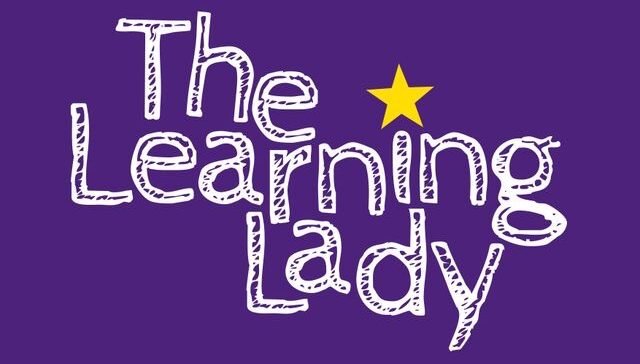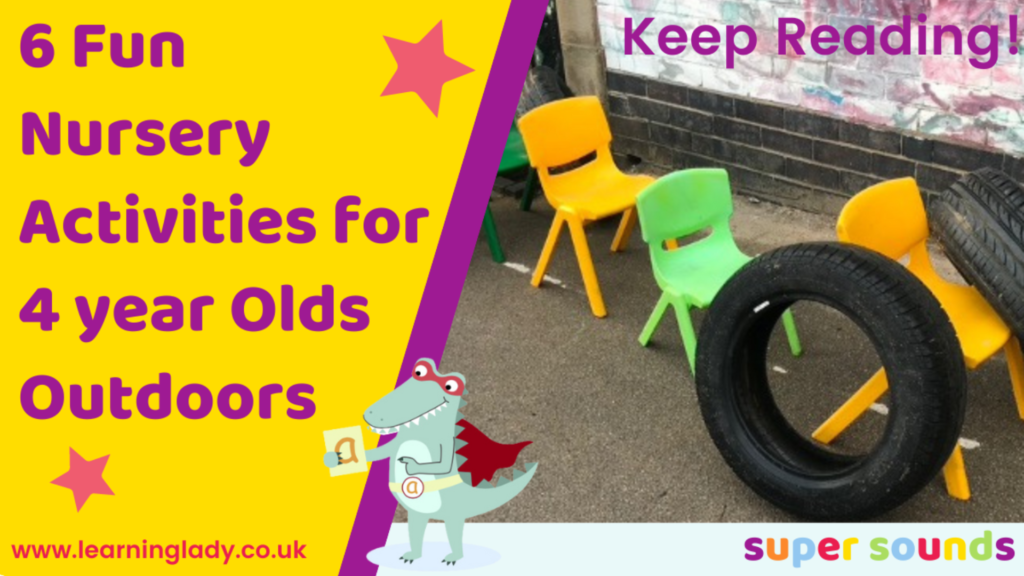It was summertime when I started working with Little Owls Preschool. This was the perfect time to be thinking about prephonics nursery activities for 4 year olds, as well as having hours of fun outdoors.
This is the story of how some super simple preschool phonics games thoroughly engaged a lively bunch of preschoolers, preparing them for reading spectacularly well.
Outdoor Phonics for Nursery
How to teach phonics in nursery, the fun way!
Many of the practitioners were learning how to teach phonics in nursery for the first time. So, we began by looking at the critical role of engagement.
Engagement occurs when preschoolers are engrossed and active. Their bodies and brains are busy, which means that vital learning is taking place.
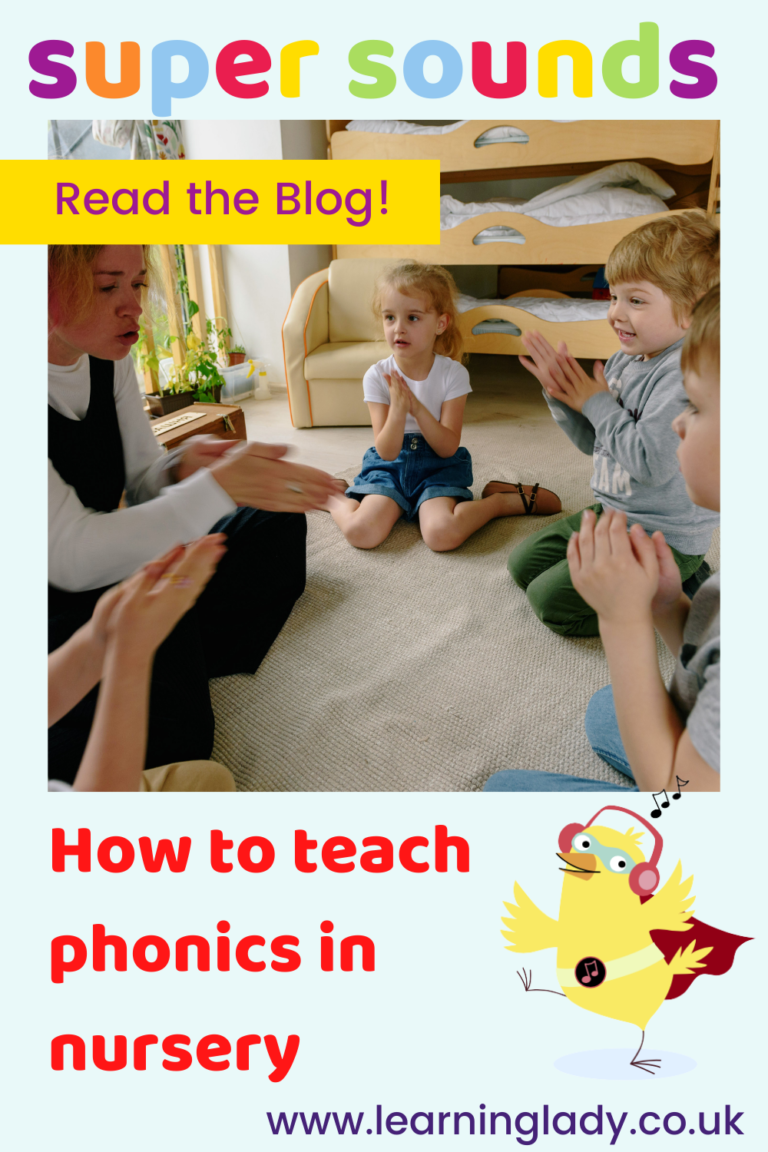
Engagement is critical because, the higher the engagement, the more practise preschoolers are experiencing in a meaningful way.
The more practised preschoolers become in every prephonic skill, the more ready for reading they’ll be.
The staff team at Little Owls were new to phonics for nursery.
With varying levels of experience and expertise, they wanted to know how to help the children with some practical ideas, to use straight away.
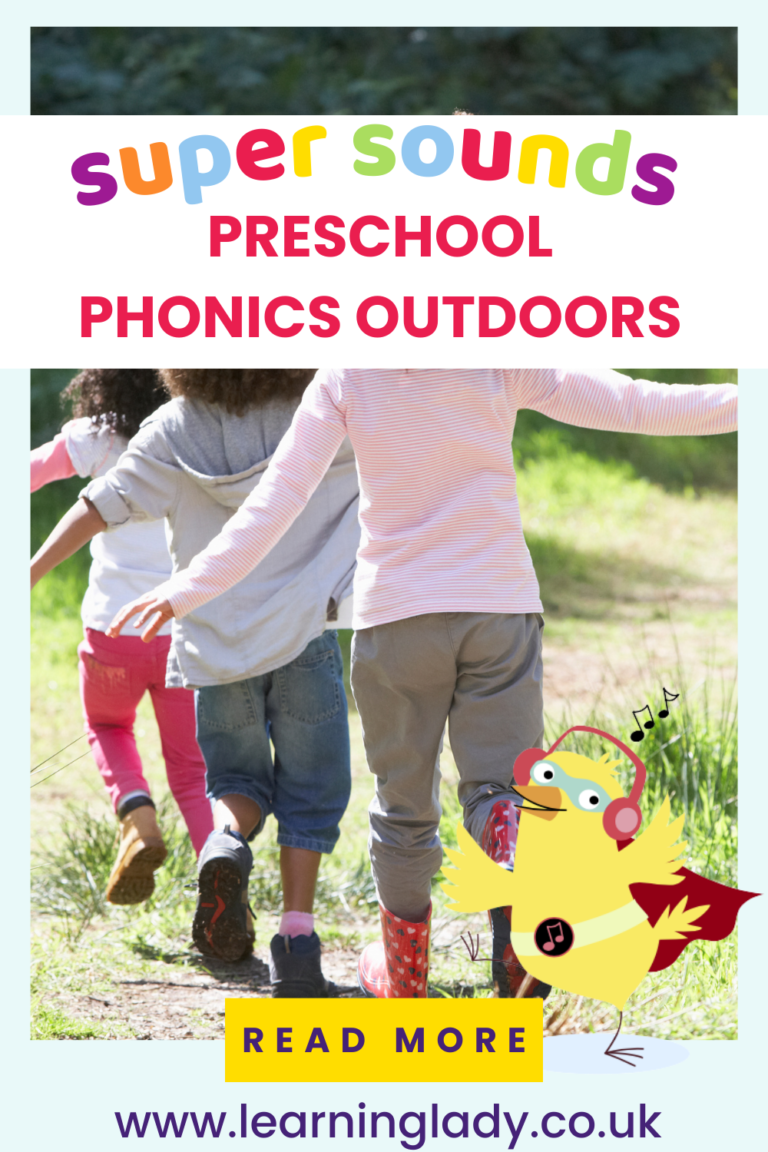
Preschool Phonics Outdoors
Taking preschool phonics outdoors is ideal to maximise essential engagement, particularly in the summertime.
The outside environment lends itself to movement and multi-sensory learning which may be harder to achieve inside.
The staff at Little Owls Preschool immediately recognised that some of their 4-year-olds engaged much better in play and learning outside
Phonics for Nursery Outdoors
Like most of us, they identified a core group of preschoolers who were always on the move. The staff were intrigued to know how they could develop phonics for nursery in the preschool garden.
Preconceptions about phonics in nursery
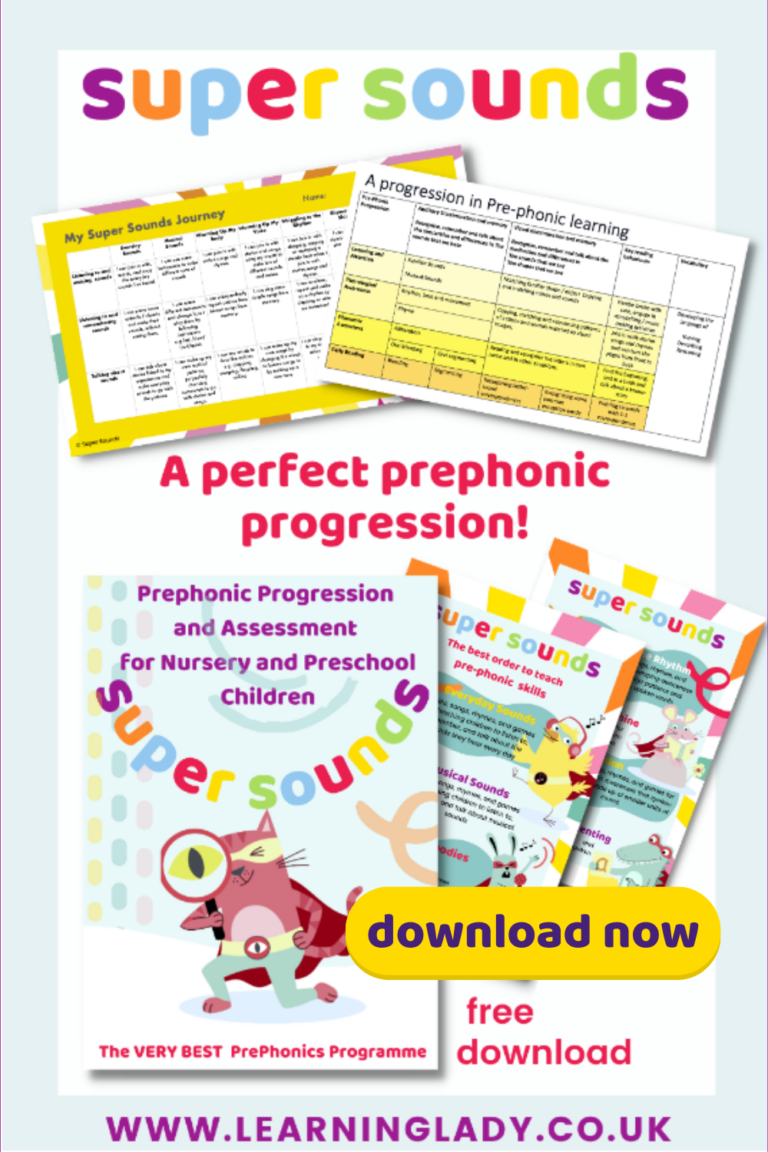
Next, I introduced this super simple prephonics progression, illustrating the important step-by step nature of prephonic development. This would guide the team about where to start.
Some of the staff at Little Owls were concerned that none of the examples for phonics in nursery involved recognising letters and sounds.
This easy peasy checklist helped staff to see the whole prephonic picture immediately which was hugely reassuring.
The best preschool learning activities for 4 year olds
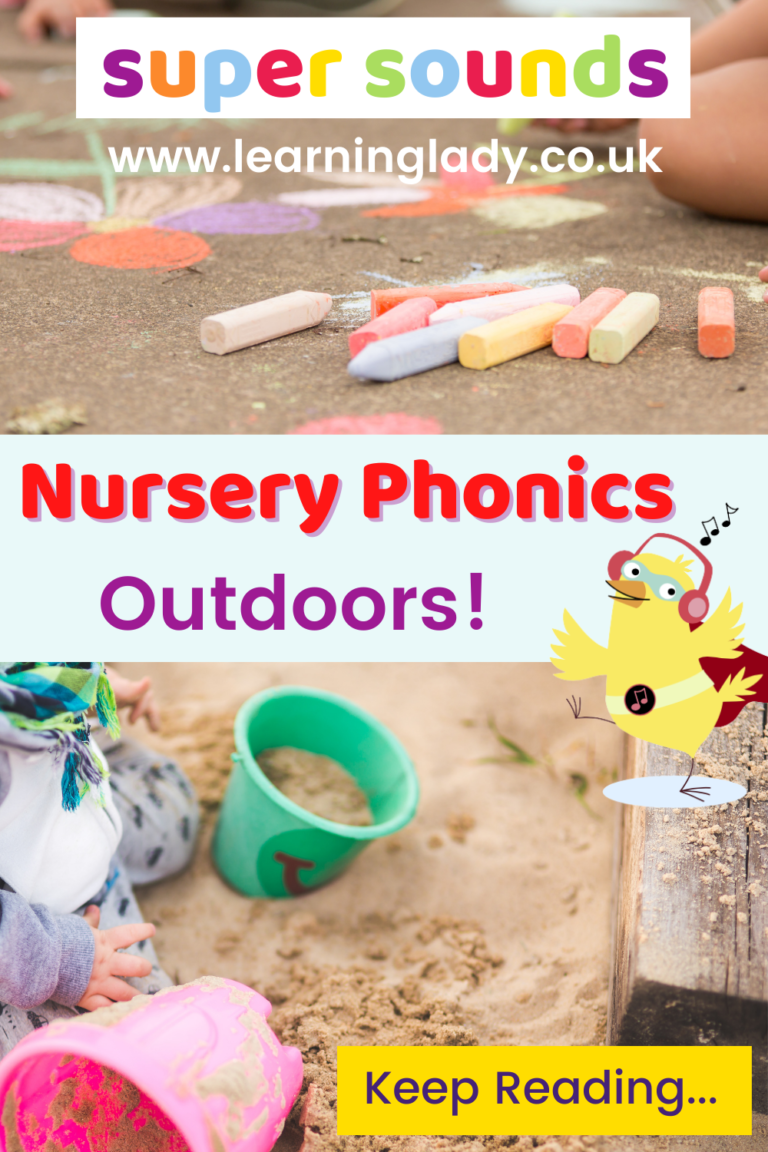
Using this tried and tested prephonic progression was game changing!
The staff at Little Owls could now pinpoint prephonic next steps, matched to exactly what each of the children needed. This reduced their fear of needing to rush ahead with the unnecessary introduction of letters and sounds before school.
The outdoor preschool learning activities for 4-year-olds were instantly set to improve as a result.
Active Nursery Phonics
Little Owls staff began developing new outdoor phonics games by turning well known outdoor activities into nursery phonics games, with a twist!
Scavenger hunts, races, and cheerleading pom poms were the perfect starting point.

We used the super successful games from Super Sounds to explore how the same games could be slightly adapted to develop different prephonic skills matched to groups of children.
Adding new activities to the Nursery phonics planning
The staff at Little Owls were ready to start adding the new ideas to their nursery phonics planning for outdoors.
We carefully considered the differences in learning outdoors and inside. The resources chosen only included those which were suitable for moving on a large scale, and that were weatherproof!
Resourcing Nursery Phonics activities outdoors
List of ideas:
- Hoops for jumping through or sorting
- Old pots and pans to make a rhythmic band
- Plastic chairs or waterproof cushions for role play
- Sand to hide things in
- Cheerleading pom poms
- Small cones to mark the beginning and end of races
- A speaker to play sounds and music from a device
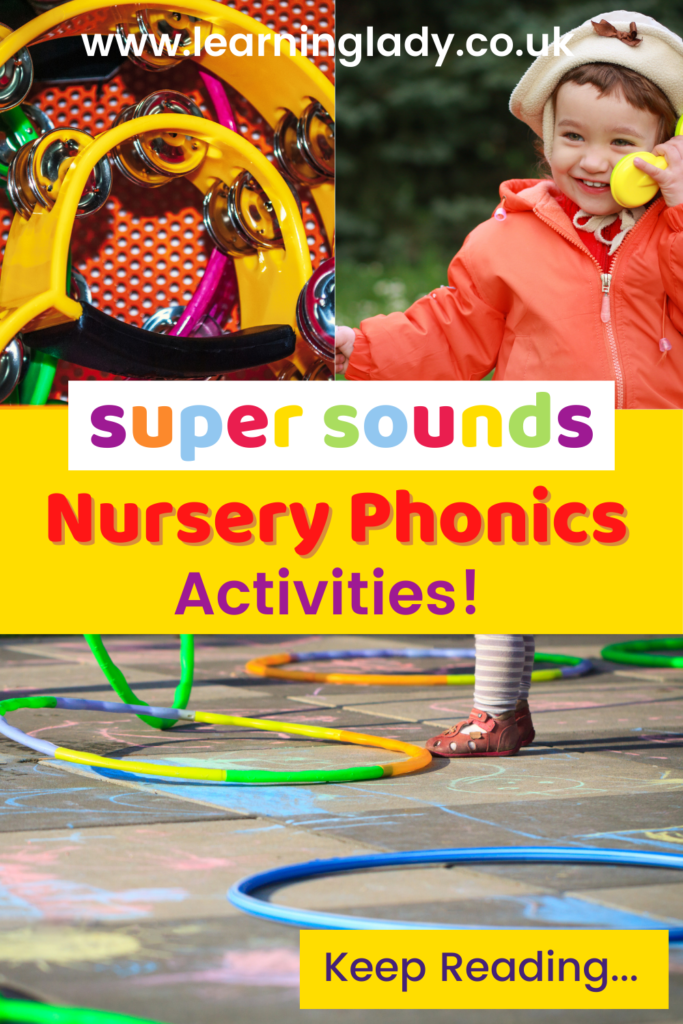
The staff at Little Owls were delighted that there was very little to prepare for these new nursery phonics activities. This would save them hours of time, but also meant that there would be an instant impact on the children.
6 Outdoor phonics nursery activities for preschoolers
Here are 6 hugely popular nursery activities for preschoolers that we played outdoors at Little Owls Preschool. Each activity is suited to a different developmental prephonic skill which means outdoor nursery activities for 4 year olds can be heaps of fun for everyone!
Outdoor Nursery activities for 4 year olds: Noisy Egg Hunt
At Little Owls the preschoolers loved to play hide and seek! The staff and children were lucky. They had a space with trees and bushes to hide behind which made this a perfect game for the 3- and 4-year-olds.
Outdoor Phonics Nursery activities for 4 year olds: The Train Ride
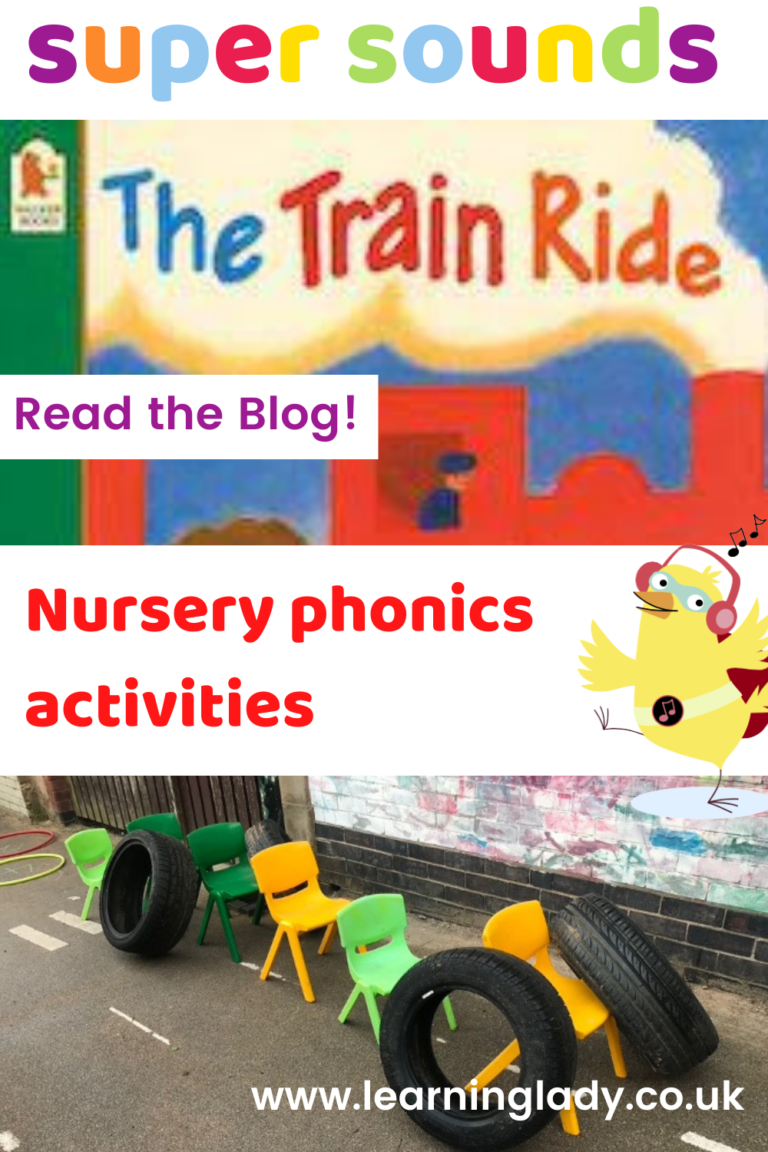
This easy peasy train ride game is super speedy to prepare for developing an awareness of rhythm. The children at Little Owls loved taking it in turns to be the driver, jumping on and off the train with their pretend tickets!
What You Need:
Some chairs (or objects to sit on) arranged in a line to create a pretend train.
How to play
Explain that the children are going to be playing a game using the pretend train.
Line the children up as if they are standing at the station.
Begin by saying this rhyme aloud, with the children tapping a steady beat for the motion of the train.
“Getting on the fast train,
ready for a ride,
don’t forget your ticket,
(Add a name) step inside.”
Act out taking a pretend ticket from the named child, who then gets onto the pretend train.
Encourage all the children to join in with the following chant, again tapping out a steady beat for the motion of the train.
“Clackety clack,
Clackety clack,
Clackety clackety
Clackety clack”
Repeat the process of saying both parts of the rhyme all together, maintaining a steady beat.
Choose more children until everyone is seated on the train.
Now change the rhyme as the children leave the train, slowing the pace of the rhyme.
“Coming to the station,
The fast train starts to slow.
Choo choo wave goodbye
(Add a name) off you go.
The named child waves goodbye and leaves the train as the remaining children to join in chanting as before.
“Clackety clack,
Clackety clack,
Clackety, clackety,
Clackety clack”
Repeat the process with further children until all the ‘passengers’ are off the train.
Outdoor Phonics Nursery activities for 4 year olds: Rhyming Race
Learning to rhyme takes lots of practise, so finding fun filled, active opportunities is key. The children at Little Owls loved running around to play this game so much. They didn’t realise how much they were actually learning.
Outdoor Phonics Nursery activities for 4 year olds: Pirates dig for treasure
The months before children transition into school are all important for developing an awareness of alliteration. This involves helping preschoolers to hear and say similarities in spoken sounds at the beginning of words. Alliteration doesn’t need to be complicated or scary, and this action-packed pirate’s treasure game is a great example.
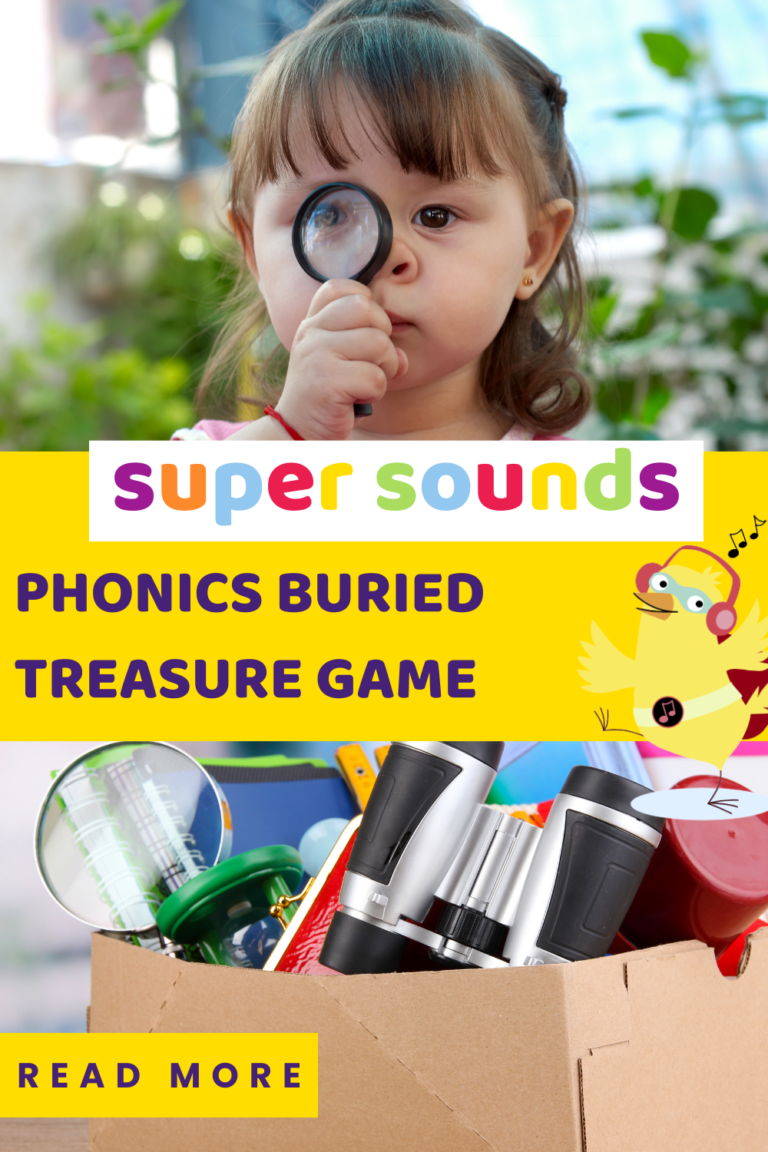
What you need:
A large box to store the collected items.
Everyday objects described by alliterative patterns, when two words next to each other begin with the same spoken sound. Write these down in a list.
For example.
A pink pencil, snipping scissors, purple paper, Christmas card, sparkling sequins, big block, bouncy ball, bean bag, hula hoop, pig puppet, squirty soap.
You’ll need to think of no less that 3 objects per player.
A 5-minute timer (you could use any device for this)
How to play
Introduce the large box and the list, explaining that the children need to find all the objects from your list, filling the box as quickly as possible.
Using the alliterative patterns previously written in the list, assign each child with an object to find.
For example
“Hamza, can you find me a purple pen, Lily can you find me some red ribbon, and Kai can you find me a shiny shell.”
This is a timed game, so the children need to find the objects as quickly as possible. Remind the children that the aim of the game is for the children to collect all the items on the list, filling the box before the 5-minute timer sounds.
Check that the children know what they are looking for, reminding them to use both alliterative words to describe each item.
For example
“I’m looking for a purple pen”.
Remodel both alliterative words if the children are still at the one-word naming stage.
Set the timer and observe the children as they search for the alliterative items, supporting as necessary.
As children find the items and return to the box, check again to see if they can use the alliterative words to describe what they’ve collected. Check each found item off the list together, providing each child with a new alliterative object to find.
Continue issuing new words, as the children search, find, then check off alliterative items, until either the timer sounds, or all the objects are collected from the list.
At the end of the game, gather the children to check the contents of the box.
Using the list, read each of the alliterative items aloud. Can the children match the spoken words with the objects in the box?
Outdoor Phonics Nursery activities for 4 year olds: What’s the Word Mr Wolf?
The traditional game ‘What’s the time Mr Wolf?’ was the inspiration for this game. All the Little Owls staff remembered playing this game at school, so this was a firm favourite from the start. Play this game day in, day out, before children move to school, for hours of active oral blending and segmenting practise.
Outdoor Phonics Nursery activities for 4 year olds| Cheerleading pom poms
Little Owls Preschool had some cheerleading pom poms at the back of the shed. The preschoolers loved using them, but the staff thought that this play lacked purpose. The children had enjoyed using the pom poms for counting, so with a few adaptations, this quickly became a fun oral blending game too.
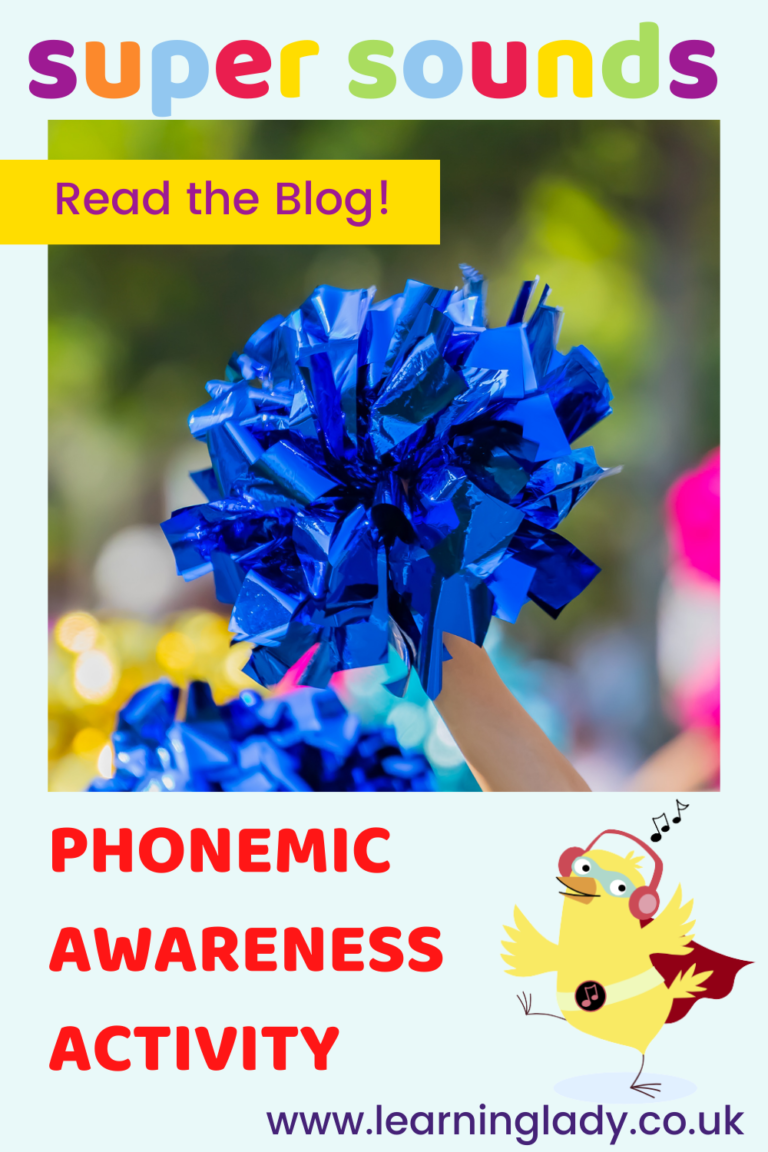
What you need:
Cheerleading pom poms
A large space to play
A list of words you’re going to be using. Words which include 3 separate spoken sounds (often known as c-v-c or consonant-vowel-consonant words) are best
These could include words like c-a-t, f-o-x, h-e-n, p-o-t, l-i-p, c-a-n
How to play:
Explain that the children are going to be cheerleaders. You might need to use the internet to show them some cheerleaders to get the idea before they begin.
Give out the cheerleading pom-poms so that all the children have at least one.
Demonstrate using your cheerleading pom poms, encouraging the children to join in by copying. Raise 1 pom pom in the air to match each spoken sound, then shake both pom poms in the air when saying the whole word out loud
For example: Adult – “Give me a ‘L’ ! Give me a ‘E’! Give me a ‘G’! What have we got…?!” Children – “Leg!”
As the children build confidence, encourage as much joining in as possible with further words. Can they join in with the sounds and the actions?
Make the game more challenging by adding increasingly more complex words based on your observations. This is a good way to support and practise enunciation of different spoken sounds which children might be struggling with, such as d-r rather than j in d-r-u-m, or tr rather than ch in train.
Invite more confident children into the adult role to lead the group.
Nursery Phonics Planning
If your preschooler enjoyed playing these Outdoor prephonics games and you want to continue the prephonics fun, then Super Sounds is just what you need
It’s an evidence-based, tried and tested prephonics programme that is designed specifically for 2,3 and 4 year olds.
Perfect for using before any phonics programme, Super Sounds is uniquely written for a fun and engaging approach to teaching a progression of prephonic skills step by step.
Whether you want fresh ideas as an alternative to Phase 1 Phonics, or you’re new to phonics in nursery and don’t know where to start, Super Sounds is waiting for you!
